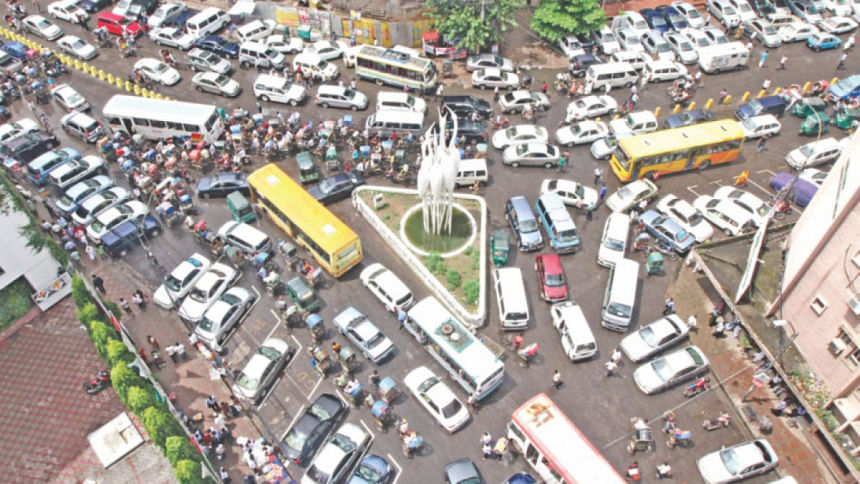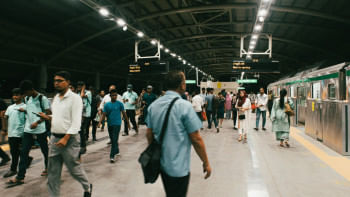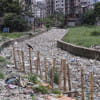Why Dhaka has become unliveable

Picture this: you're standing in the middle of Shahbagh at 8:30am. The sun is already a vengeful orb, the air tastes like exhaust fumes and unfulfilled promises, and the traffic—oh, the traffic—is a fossilised river of cars, rickshaws, and humanity. A man in a sweat-soaked shirt argues with a CNG-run autorickshaw driver over a fare increase of Tk 10. A schoolgirl hops over a sludge-filled pothole, her uniform skirt flapping like a surrender flag. Somewhere, a protest slogan echoes, muffled by the honking symphony. Welcome to Dhaka, the city that never sleeps, because it's too busy being stuck in traffic, dodging waterlogged streets, or wondering if today's political demonstration will be the one that finally tips the collective sanity into the abyss.
A recent editorial by The Daily Star, titled "This is not how a city can survive", is a primal scream into the void. It catalogues Dhaka's daily crucifixion: protests that gridlock entire neighbourhoods, infrastructure that crumbles faster than a biscuit in cha, and a government that seems to treat citizen welfare as an afterthought in its grand political opera. But how does one survive here? Not just exist, not just endure, but carve out a sliver of dignity—or at least a functioning Wi-Fi connection—amid the chaos? Let's muse.
Dhaka operates on a unique principle: maximum effort, minimum progress. You leave home at 7am to reach your office five kilometres away by 9am, only to discover that a spontaneous protest has turned the road into a car park. The protesters, bless their democratic hearts, are exercising their right to dissent. The traffic police, meanwhile, are exercising their right to vanish. You sit. You sweat. You contemplate the existential irony of a metro rail gliding overhead while your CNG-run autorickshaw dies.
The editorial nails it: this isn't just inconvenience, it's systemic erosion. When protests metastasise into daily blockades, when VIP movements reroute entire neighbourhoods, when monsoon rains turn roads into Venetian canals (sans the romance), the city becomes less a habitat and more a stress simulator. The elderly, the sick, the parents hauling toddlers through sludge—these aren't extras in a dystopian film. They're us. And the tragedy isn't just the suffering, it's the normalisation of it. We have mastered the art of shrugging, "Ki ar korar? Eitai to Dhaka."
But here's the twist: Dhaka's chaos is also its alchemy. The same streets that trap you for hours host impromptu tea stalls where strangers bond over shared misery. The protests that infuriate you also remind you that dissent, however disruptive, is a heartbeat this city refuses to silence. Survival here isn't about avoiding the chaos; it's about learning to dance in the rubble.
Let's be honest: optimism in Dhaka feels like bringing a parasol to a tsunami. The just-revealed Global Liveability Index 2025 ranks us 171st out of 173 cities, below even Kyiv, a city currently hosting an actual war. Our air quality rivals industrial chimneys. Our infrastructure budget seems to evaporate faster than rainwater in July. And don't get me started on the mosquitoes—Aedes aegypti, the unofficial mascot of our public health nightmares.
Yet, cynicism is a luxury this city can't afford. The editorial's plea to prioritise citizens' well-being isn't just a policy suggestion; it's a survival manifesto.
The government's inertia—whether in tackling air pollution, fixing roads, or addressing inflation—is a masterclass in absurdity. The new metro rail? A Band-Aid on a bullet wound. The real solution—disciplined traffic management, green spaces, functional public transport—remains as elusive as a quiet afternoon in Gulistan.
Surviving Dhaka demands a sense of humour. Not the slapstick kind, but the gallows variety. Take the Great Waterlogging Chronicles: you invest in waterproof shoes, only to discover the real enemy is the floating garbage island blocking the drain. Or the VIP Movement Saga, where your entire commute is derailed because someone's convoy needs to glide through the city like a pampered comet. And then there's the Protest Paradox: you support the right to demonstrate but draw the line when it turns your 20-minute errand into a three-hour odyssey.
The editorial's call for "responsible protest" is noble but feels like asking a tornado to mind its manners. Protests here aren't just political theatre; they're catharsis. When the system grinds you down, blocking a road feels like the only megaphone you've got. The problem isn't dissent—it's the collateral damage. A city can't thrive when its arteries are clogged daily, when ambulances are trapped behind slogan-chanting crowds, when students miss exams because the streets are a battleground.
But imagine this: What if protests were organised with precision? What if the government actually planned for them, rerouting traffic, designating zones, ensuring that emergencies aren't collateral damage? What if, instead of adversarial standoffs, we had dialogue?
To survive Dhaka, you need a strategy. Start by embracing the absurd: treat every crisis as a plot twist. Stuck in traffic? Perfect time to memorise a poem. Power outage? Candlelit introspection hour. Find your oasis—a rooftop garden, a quiet cafe, a library corner—and claim a sliver of peace amid the bedlam. Channel your inner Tagore; the man wrote about birds and freedom while colonialism loomed. Create beauty anyway. Demand better, but build resilience: advocate for change, but don't wait for it. Plant a tree. Mentor a kid. Fix a pothole yourself (if the city won't). And above all, laugh. Loudly. Because if you don't, you'll cry.
The editorial ends with a plea for collaboration—government, parties, citizens—to stop treating civic life as a hostage. But collaboration requires trust, and trust is in shorter supply than parking spots here. Yet, hope persists, in the students demanding safer streets, architects designing vertical gardens, journalists chronicling both collapse and resilience.
Dhaka is a city of contradictions. It's a place where you can attend a rooftop art exhibition overlooking a slum, where a phuchka vendor philosophises about inflation, where the smell of rain on concrete mingles with the stench of neglect. It's unliveable. It's home.
The editorial is a mirror held up to our collective face, reflecting exhaustion, yes, but also a stubborn refusal to surrender. Survival here isn't passive; it's a daily rebellion. So, the next time you're trapped in traffic, roll down your window. Share a snack with the rickshaw wala. Complain about the potholes. Dream of a better city. And remember: Dhaka's chaos is also its pulse. As long as it beats, so do we.
Zakir Kibria is a writer and policy analyst. He can be reached at [email protected].
Views expressed in this article are the author's own.
Follow The Daily Star Opinion on Facebook for the latest opinions, commentaries and analyses by experts and professionals. To contribute your article or letter to The Daily Star Opinion, see our guidelines for submission.

 For all latest news, follow The Daily Star's Google News channel.
For all latest news, follow The Daily Star's Google News channel. 










Comments